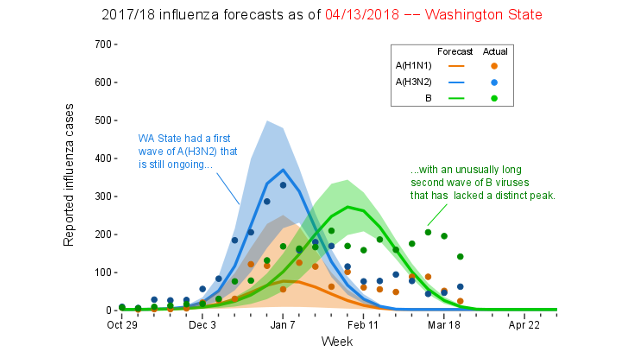As the flu spreads, vaccination offers protection

A study helps confirm U.S. guidelines encouraging people with high-risk conditions to get the shot
By Michael L. Jackson, PhD, MPH Kaiser Permanente Washington Health Research Institute (KPWHRI) associate investigator
As an influenza researcher, I regularly check local and national reports about the flu. According to the U.S. Centers for Disease Control and Prevention (CDC), our current flu season started in mid-December. The typical season lasts well into spring.
As of January 5, 2019, CDC data show we’re in an elevated phase of the flu season, with national outpatient visits for flu-like illness at 3.5 percent, which is above the baseline level of 2.2 percent. A data point that concerns me in the latest report is that so far for the 2018–2019 season, 16 children in the United States are reported to have died from the flu.
The influenza virus comes in several strains. So far, the strain dominating the 2018–2019 season has been H1N1, which tends to be less severe than others. But H1N1 can still cause severe illness and death, especially in young children. Influenza hospitalization rates for children under age 5 are on the rise.
Fortunately, vaccination against influenza goes a long way toward protecting people, including children. Many studies, including from KPWHRI, show that flu vaccination protects against getting the flu. About 80 percent of pediatric deaths from flu are in unvaccinated children, but a study in 2017 showed flu vaccination reduces risk of flu death by at least 50 percent.
Good news for people with high-risk conditions
And what about vaccination for people with chronic illnesses? That was the subject of a recent national study involving Kaiser Permanente Washington members. I lead the KPWHRI site of the United States Influenza Vaccine Effectiveness Network, which is five sites across the country that compare laboratory-confirmed cases of the flu in people who were and were not vaccinated. From the data, we measure how well each year’s flu vaccine works, so we can try to get better each year.
With the help of people who get care at sites in the network — including more than 6,000 Kaiser Permanente Washington members — we recently got answers to an important question about flu vaccine guidelines. We know that people with certain conditions such as asthma, heart disease, and diabetes are at higher risk of serious flu complications than people without these conditions. For that reason, since the 1960s, public health agencies have recommended the flu vaccination for people with high-risk conditions.
However, no recent studies had tested the effectiveness of the flu vaccine specifically in people with the high-risk conditions on the public health guideline list. We needed evidence to know if getting vaccinated actually helps people with these conditions in the real world. My Influenza Vaccine Effectiveness Network colleagues and I conducted a study (Abstract) over four flu seasons from 2012 to 2016. Our participants were people of all ages who visited clinics in Wisconsin, Texas, Michigan, Pennsylvania, and at Kaiser Permanente Washington because they thought they might have the flu.
Using medical records and an accurate laboratory test for influenza, we found that:
· People with high-risk conditions were more likely to be vaccinated than people without high-risk conditions (63 vs. 40 percent).
· The flu vaccine was effective for people with the high-risk conditions, reducing their risk of flu by 41 percent.
· The vaccine was slightly less effective in adults with high-risk conditions compared to adults without, but in children, high-risk conditions were not associated with differences in vaccine effectiveness.
Our conclusion: People with conditions such as asthma, heart disease, kidney disease, diabetes and other chronic conditions should get the flu vaccine. It’s effective, even in people with high-risk conditions, and it can protect against the flu.
Flu vaccinations are available at all Kaiser Permanente medical offices. More information is available here on the Kaiser Permanente Washington website.
research into action

Can targeted flu vaccines lower the risk of hospitalization?
Dr. Paula Lozano explains how a Learning Health System project finds Kaiser Permanente Washington members who could benefit most from preventive services.
Live Healthy

Flu shots boost your chances of staying well
While flu vaccine effectiveness varies year to year, it still makes sense to get immunized annually.
Read about it in Live Healthy.
Forecasting flu

Flu season 2017-18 is winding down — What did we learn?
Dr. Michael Jackson gives a late-season report on state and national influenza patterns and his Flucaster prediction model.


